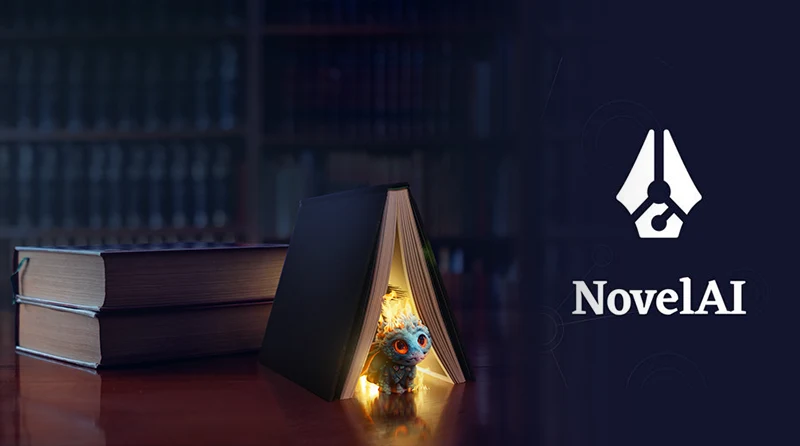15+ Novel AI Alternatives to Try In 2026

You sit down to write a story or sketch out a scene and turn to Novel AI. Then the friction starts, and momentum comes to a stall. The subscription feels too steep for something you only use occasionally. The filters strike down your darker sci-fi passages. The output style doesn’t match your vision.
If the frustration feels familiar, explore NovelAI alternatives and find a partner that collaborates with you, doesn’t overcharge, and provides you with the flexibility to utilize every feature without strict limits.
The generative AI field is wide and moving fast. There are capable, flexible, and often free Novel AI alternatives that can do exactly that.
In July 2025, an AP-NORC poll found that about six out of ten U.S. adults have used AI to search for information, with adults under 30 being especially likely to use it for tasks like brainstorming ideas. In short, AI is now an everyday kit for many new writers. Comparing NovelAI alternatives free or paid, is the practical next step. Writers want better memory, clearer policies, and pricing that fits long sessions.
We’ve tested the options and put together a clear guide to the strongest alternatives to Novel AI for creators with different workflows.
What is Novel AI?
NovelAI is a subscription tool for creative writing and anime-style image generation. It launched in 2021 for writing and added image generation in October 2022. It’s owned by Anlatan and runs as a web app (installable as a PWA on mobile).
The tool works best for visual-novel writers, manga creators, RPG game masters, and anime fans who want tightly integrated storytelling plus illustrations.
For writing, it offers long-form support and persistent story memory through Lorebooks, Memory, and Author’s Note, plus a Context Viewer that shows exactly what goes into the prompt. On the image side, you get an anime-focused generator and Vibe Transfer, which pulls the style and feel from reference images. Stories can be stored locally or kept end-to-end encrypted on NovelAI’s servers.
Why are people looking for an alternative to Novel AI
NovelAI helps many writers, but it isn’t a perfect fit for everyone. The main reasons to consider alternatives are:
1. Cost and plan fit
NovelAI is subscription-only. Public plans list Tablet $10/month, Scroll $15/month, and Opus $25/month. If you write often or run long RP sessions, that monthly spend is what many users benchmark against other free Novel AI alternatives.
2. NSFW and censorship policies
NovelAI is widely seen as more permissive with mature themes than mainstream chat tools. That said, policies and model behavior can shift with new releases, and community threads regularly voice worry about surprise filtering or future changes. Therefore, some creators prefer platforms with explicit, clearly documented NSFW rules.
3. Memory slips and context length
Context is tier-linked. NovelAI’s Opus plan historically offered 8,192 tokens of context for writing. And now an untuned GLM-4.5 preview raises website context to 28,672 tokens, which still isn’t limitless for epic projects. Even on Opus, users report the model dropping details once the active context fills, which is why some writers look for larger windows or stronger memory tooling.
4. Privacy trade-offs (cloud vs local)
NovelAI encrypts stories client-side before remote storage, but it’s still a cloud web app; privacy-first writers often choose local tools that can run fully offline so drafts never leave the machine.
5. Model pace
Community threads note a slower cadence of new tuned text models, while rivals shipped strong 2024–2025 models like Claude 3.5, OpenAI o3, and Llama 3.1, pushing some creators toward region-friendly or offline alternatives.
6. Regional availability and payment
NovelAI bills through Chargebee, and processor rules or bank checks can block sign-ups in some regions. Common causes include card-issuer declines and location mismatch between billing country, IP address, or card BIN.
List of 10 Best Novel AI Alternatives for 2025
If you’re searching for Novel AI alternatives that deliver comparable storytelling power without breaking the bank, the table below provides an overview of the current AI-powered alternatives ranked by closeness to NovelAI’s interactive-fiction and role-play loop.
| Tool | Key features | Best for |
|---|---|---|
| Writecream | Templates, long & short formats, audio/ voiceover, 75+ languages | Fast marketing drafts, email outreach, quick audio/voice assets. |
| Rytr | Multiple tones, “My Voice”, plagiarism checks, browser & extension support | Low-cost, template-driven drafting across web/apps with plagiarism checks. |
| Dreamily | Worlds, character chats, light roleplay | Mobile-first writing and world-building. |
| AI Dungeon | Scenarios, Memory Bank, branching, context scaling | Game-like, unpredictable adventures. |
| FableAI | Text adventures, character play, branching paths | Mobile RPG-style interactive stories. |
| DeepFiction AI | Story plus image generation, credit system, roleplay support | Unrestricted creative & adult storytelling. |
| Janitor AI | Character chat, toggle models, roleplay-centric | Tech-savvy users who want model freedom. |
| DeepStory | Storybooks, images, narration, branching | Screenwriters and creators drafting scripts or story beats with AI help. |
| Squibler | Planning, AI book drafts, exports | Organized long-form writing and full manuscript drafting. |
| Dreampress | Custom story arcs, collaborative writing, AI-powered editing tools | Writers seeking polished drafts and co-creation with AI support. |
Top 16 Novel AI Alternatives
If you want interactive fiction that flows and tight drafts with fewer roadblocks, the top NovelAI alternatives detailed below are worth considering.
1) Writecream

Writecream is a general AI writing suite with article templates, cold email “icebreakers,” long/short article generators, and built-in audio for podcasts and YouTube voice-overs with multi-voice support. If you publish narrated drafts, these tools are essential. The tool is web-based and can be considered a free alternative to Novel AI as it offers a “Free Forever” plan.
Pricing:
The Free Forever plan offers 20 credits. “Unlimited” is listed at $9/ 9/month.
Unique value:
Text-to-audio and podcast/voice-over generation are bundled alongside writing templates.
| Pros | Cons |
|---|---|
| Audio outputs (podcasts, voice-overs) built in. | Not an IF/RP engine; no character cards or lorebooks. |
| 75+ languages are supported, and a plagiarism checker is listed. | “Unlimited” is a limited-offer marketing line; verify exact offerings at checkout. |
2) Rytr

Rytr is a low-cost AI writing assistant built for drafting, but not for role-plays. It works in over 30 languages and in 20+ tones. The tool has a Chrome extension, includes a Copyscape-powered plagiarism checker, and adds “My Voice” so outputs match your tone. Plans are straightforward, with a public pricing table that spells out character limits and monthly plagiarism checks.
Pricing:
The “Free forever” plan has character caps. Unlimited generation allowed at upwards of $9/ 9/month. Annual discounts are available.
Unique value:
Truly low entry pricing for “unlimited” generations on the individual tier.
| Pros | Cons |
|---|---|
| Transparent pricing tables reduce purchase risks. | Not an IF/RP tool; no scene memory/lorebooks. |
| SEO tools are built in. | Terms restrict certain verticals (e.g., adult services) |
3) Dreamily

Dreamily is one of those Novel AI alternatives that offers much of Novel AI’s core writing function without charges, making it a fantastic starting point for budget-conscious writers. It has a strong mobile presence and can switch between three different writing models (General, Romance, Fantasy) to better match your story’s tone. It’s “World” feature stores background, characters, objects, and relationships, your “Dreamipedia” for consistency.
Pricing:
Free quota with limited features. Power packs for maintaining AI continuation stars at $5.99.
Unique value:
Writing on the go with full iOS/Android apps, along with VR/AR previews that let you “walk” through generated worlds.
| Pros | Cons |
|---|---|
| Multiple model choices with genre-specific aids. | Long, novel-length threads can lose details over time. |
| A simple interface that works on the web and mobile. | Analytics/voice aren’t core features. |
4) AI Dungeon

AI Dungeon is a no-code, game-like storyteller: you type an action and the AI narrates what happens next, building a branching adventure with you on web or mobile. It also lets you pick from several AI models, load scenarios, build Worlds, and keep details via its Memory Bank. Recent updates have focused on a bigger context and UI/memory improvements.
Pricing:
Free version with limited token context; paid tier starts at $9.99/month.
Unique value:
Deep Memory Bank, plus a large library of player-made scenarios.
| Pros | Cons |
|---|---|
| Huge scenario library with publishable content clearly defined. | Heavy use can require a paid plan. |
| Generous free tier supported by ads. | Public publishing is moderated; some topics are “unpublishable.” |
You Might be Intereseted in: 15 Best Free AI Dungeon Alternatives
5) FableAI

FableAI is a web text-adventure platform for deep worldbuilding and narrative generation. It includes structured tools for timelines, relationship maps, and a shared lore “codex,” keeping facts consistent as your story grows. The AI helps you expand worldbuilding across history and cultures. Scenario tools keep multi-character arcs on track. It’s built for writers who want a dedicated workspace to manage complex details.
Pricing:
Free trial with 100 credits; $2.32/month for 1,000.
Unique value:
Easy, no-install web adventures to sample AI interactive fiction.
| Pros | Cons |
|---|---|
| AI-powered timeline and relationship maps help maintain consistency across a large story. | Heavy use can require a paid plan. |
| Generous free tier supported by ads. | Less focused on prose generation than Novel AI. |
6) DeepFiction AI

DeepFiction blends story, image, and role-play generation with a credit system plus daily free credits. Plans list “Starter,” “Basic,” and “Pro,” and an optional one-time “Flow” workspace for long-form writing. The FAQ clarifies how credits work and free-user limits. Marketing copy leans into unfiltered storytelling; always confirm terms if you publish or share content.
Pricing:
The starter plan is priced at $5/ 5/month. One-time payment packs start at $10.
Unique value:
Daily free credits plus credit math spelled out for both free and paid users.
| Pros | Cons |
|---|---|
| A clear FAQ on usage makes operations easy. | Credit framing (“stories per month”) may feel abstract. |
| Combined stories, images, and RP. | Writing style may be less flexible. |
7) Janitor AI

Janitor AI is a role-play hub with custom character cards, immersive chat, and multiple engine options. It’s a Novel AI free alternative as its core use is free. But paid upgrades and API usage may apply inside the app. An NSFW toggle exists for adult contexts. It’s flexible, moddable, and popular with RP users who want granular control and character exports.
Pricing:
Fully free.
Unique value:
NSFW toggle and multi-engine flexibility (built-in JanitorLLM or BYO APIs).
| Pros | Cons |
|---|---|
| Uncensored content policy. | Requires bringing your own API key (can be costly and require technical know-how). |
| A large community actively creating characters. | The platform can be slow under heavy load. |
Also Read: 20 Janitor AI Alternatives
8) DeepStory

DeepStory, one of the Novel AI alternatives, is free to use and focuses on screenplay or script generation. You can generate character dialogue, scene descriptions, and action from a simple prompt. It also provides tools for creating character sheets and story outlines. It’s a specialized tool for video creators, game developers, and screenwriters. The platform is web-based and suits writers mixing text with visuals.
Pricing:
Free to use. Create a free account to unlock extras.
Unique value:
A focused, screenplay-first AI that can generate and continue scripts in standard screenplay format.
| Pros | Cons |
|---|---|
| Free to use for script and story generation. | Geared to screenwriting, not long-form prose. |
| You can import and continue existing scripts, and export when you’re done. | Basic UI/feature set compared with paid, pro suites. |
9) Squibler

Squibler is a drafting environment with book/scene planning, AI prompts, and export options. It’s a classic “plan, draft, revise” tool rather than a role-play platform. The pricing page outlines annual billing for its Pro plan, and the “AI Book Generator” page explains the workflow. If you’re moving a manuscript toward publication with chapters/scenes and exports, it lands in familiar territory.
Pricing:
Free plan with 6,000 AI words/month; Pro is $16/month billed annually ($192/year).
Unique value:
An end-to-end book builder that can generate a full first draft and includes planning tools (templates, boards/corkboard-style outlining).
| Pros | Cons |
|---|---|
| Can spin up a full manuscript from a prompt. | RP workflows are not a focus. |
| Strong organizing aids: templates, planning boards/corkboards. | Fewer lore/memory controls than IF tools. |
10) Dreampress
Dreampress is a browser-based AI story generator for personalized fiction across romance, fantasy, erotica, and more. You can tag yourself into plots, generate self-insert stories, and pair text with an image library. The free tier uses daily tokens. The site also advertises an “Unlimited” plan that removes waits and adds image allowances.
Pricing:
Free start with bonus tokens and daily-limited stories, unlimited tiers start from $14.39/month.
Unique value:
Straightforward, genre-first “self-insert” storytelling for creating personalized fiction
| Pros | Cons |
|---|---|
| Simple, tag-based setup for tailor-made stories.. | Free tier uses daily token/wait mechanics. |
| The free tier allows you to try the features before upgrading. | Long runs can lose thread/memory |
11) Perchance
Perchance is a genuinely free alternative to NovelAI. It’s a browser-based sandbox for building and using text generators, from simple randomizers to lightweight interactive fiction. Many generators run without sign-up and with no daily limits, while creators get local backups and revision recovery stored in the browser. There are “offline” pages to help retrieve work if the internet drops.
Pricing:
Completely free and open-source; no premium tiers or ads.
Unique value:
A privacy-friendly tool to build your own generators, which is ideal for technically inclined creators who want custom prompts, character makers, or lightweight IF engines.
| Pros | Cons |
|---|---|
| Free, runs in the browser, with local backup/revision tools. | Advanced setups require learning Perchance’s scripting patterns/tools. |
| You can share a generator’s URL and even insert it on your site with an iframe. This makes it easy for teams to work together. | Limited advanced memory/lore features. |
12) AI Comic Factory
AI Comic Factory turns a text prompt into a comic page with multiple panels. You pick an art style (American, Japanese, Nihonga, and more), choose a page layout, add captions, and let the tool render the page. Paid plans add options like character consistency and uploading your own characters. It runs in the browser, so you can try it without a heavy setup.
Pricing:
Free version available. Starter listed at $9.99/month (600 credits).
Unique value:
A dedicated, browser-native comic generator that lets you pick styles and layouts and produce multi-panel pages from a single prompt.
| Pros | Cons |
|---|---|
| Generates full pages/panels with selectable styles and layouts. | Character consistency can vary in complex scenes. |
| An option for uploading your own characters is provided. | Finer, panel-level control is more limited than manual drawing. |
13) DreamGen
DreamGen is a web AI writer aimed at unfiltered/NSFW storytelling, with a focus on promptable personas and RP. It has a sleek chat interface, multi-character scenarios, and a “Scenario Codex” to track plot, characters, and lore. You can steer scenes in real time with inline instructions, use a separate story-writing mode, and start on a generous free tier.
Pricing:
Free to start, then subscribe at $7.83/month or higher (higher token context + credits).
Unique value:
Highly steerable RP and story writing: Scenario Codex for world info, inline instructions for plot/character control, and support for multi-character sessions.
| Pros | Cons |
|---|---|
| Strong narrative control and steerability in long sessions. | The billing model adds a learning curve. |
| Supports complex, multi-character scenarios. | RP memory depth varies by model. |
14) NovelCraft AI
NovelCraft AI is a focused AI editor for book drafts. You upload text and use three plain-English tools: Polish (fix style/grammar), Expand (add detail), and Condense (tighten pacing). It runs in your browser and uses a credit-based system, so it’s easy to buy a little or subscribe if you edit often. It’s built for quick, targeted passes.
Pricing:
One-time 3-credit pack for $1.99; 35 credits/month available with $9.99/month plan.
Unique value:
A simple, credit-based “Polish / Expand / Condense” workflow for fast, targeted novel edits.
| Pros | Cons |
|---|---|
| Low friction workflow: upload text, pick a mode, get a cleaner page. | No advanced fiction tools (e.g., lorebooks/character databases). |
| Buy-as-you-go credits or a small monthly plan. | Credit math can be difficult to estimate for an entire novel. |
15) InstaNovel
InstaNovel turns a single prompt into a short, illustrated mini-novel (typically 4–6 chapters) and emails you a mini-website to read and share. You pick an art style, submit your prompt, and the system uses GPT-3 for text and DALL·E 2 for images. It starts free (first book), but free queues can be long; today’s limits sometimes cap free runs. English-only for now.
Pricing:
First book free; skip-the-queue credit packs begin at €2.99 ($3.50) (3 credits), where 1 credit = 1 mini-novel.
Unique value:
The simplest way to generate a complete, illustrated short story from one idea is delivered as a shareable mini-site.
| Tool | Key features |
|---|---|
| One-prompt flow; choose an art style and go. | Free tier uses a daily limit/waiting queue. |
| Produces story + artwork and hosts it as a mini-website you can share. | Built for short mini-novels, not long-form drafting. |
16) StoryLab AI
StoryLab AI is a general AI writing assistant with marketing and ideation tools that can help fiction writers brainstorm hooks, blurbs, and summaries. It’s not an IF engine, but it can support ancillary writing tasks around your book process. The draw is its big template library and campaign tools you can run from the web. Treat it as a complement to your main fiction tool.
Pricing:
3 AI runs per month are free, unlimited runs at $19/month.
Unique value:
A broad, template-driven toolkit for marketers, this tool helps create blog, social, and ad copy, with a Campaign Builder to plan and generate assets.
| Pros | Cons |
|---|---|
| Huge template library; quick to ship blog/social/ad drafts. | Not designed for long-form fiction or interactive role-play; “story” tools skew brand-narrative. |
| “Unlimited” site plan exists; clear upgrade path from limited runs. | Free/Pro run limits on some tiers can feel tight; verify live limits before committing. |
How to Choose the Right Novel AI Alternative?
Now that you’ve seen the NovelAI alternatives, free and paid, use the following steps to find the one that suits you best.
1) Start with your use case
Name what you actually do: open-ended RP, long-form fiction, or quick idea sprints. If you write in a specific style (anime-inspired, cozy drama, grimdark), pick a platform that already leans that way.
2) Set a budget and check live pricing
First, fix a monthly cap on your expenditure. Then start trials. Also, plans and limits change, so confirm pricing on each site before you commit; for reference, NovelAI’s tiers are publicly listed.
3) Pick features you’ll use every week
Do you need lorebooks/world-info, collaboration, or deep customization? Or a simple workspace that stays out of the way? Prioritize what you’ll use often, not the flashiest add-on.
4) Check where you’ll write (desktop vs mobile)
If you draft on your phone, look for official apps. AI Dungeon and Character.AI both ship iOS and Android apps, which makes on-the-go writing practical.
5) Check image generation and styles
Do you need anime, photoreal, or stylized looks? Look for text-to-image, image-to-image, inpainting, and style transfer.
6) Decide on privacy and control (cloud vs local)
If you want everything to stay on your machine, go local. Several alternatives to NovelAI run models on your computer. They’re offline-capable after setup. If you expose any local server to the internet, secure it.
7) Try before you commit
Shortlist two tools, run a real scene or chapter in each, and keep the one that matches your workflow. A short trial with your draft is more useful than choosing by features alone.
Pro tip: If you write role-play, check the safety filters and how well the tool remembers character details across turns. If you draft long fiction, look for outlining, beats, scene cards, and solid export options so you can keep and move your work easily.
Conclusion
Even with the late-September GLM-4.5 preview, Reddit threads describe creators saying they’re moving off NovelAI, pointing to slow text-model updates and rivals with more advanced features. If you are also searching for options, the best NovelAI alternative depends upon what you specifically need these tools to do.
Some give you unlimited local use, others offer professional fiction workflows, and a few keep costs low. Whether you want open-ended RP, you’re drafting a novel or script, or you just need a dependable free option, this guide points you to popular choices.
Don’t get stuck on an expensive subscription. Pick any two Novel AI alternatives mentioned in this article and try them today. Go with the one that best fits your working style. Start your next chapter.
Frequently Asked Questions (FAQs)
Is there a free alternative to Novel AI?
Yes. Perchance is fully free in the browser and even keeps local backups/revisions with optional offline pages. AI Dungeon, Dreamily, and DreamGen all have free tiers you can start with; Rytr and Writecream also offer “Free Forever” plans (character/credit caps apply).
Can I export and back up my stories with Novel AI alternatives (free versions)?
Often, yes. But check each app’s scope:
- Perchance lets you download generators for offline use and provides local revision backups in your browser.
- AI Dungeon supports import/export for scenarios/story cards on the web.
Because policies change, confirm export options inside the app before committing.
What are the top free NovelAI alternatives for beginners?
Begin with tools that are simple to use, free to try, and don’t need a lot of setup.
- Rytr has a clean interface and more than 40 guided templates, including one for story plots. It also has a free plan that lets you try it out with 10,000 characters per month.
- Dreamily is very easy to use and works best on mobile devices, so you can start exploring worlds and characters for free on iOS or Android.
Are there free NovelAI alternatives that include mobile apps?
Yes. Some of the tools come with official mobile apps and enable you to write on the go, without paying first. These are:
- Dreamily: The app is available on iOS and Android, and it’s built for quick, phone-first storytelling.
- AI Dungeon: You can play and write interactive stories on iOS and Android with a free entry tier.
- FableAI: This mobile-centric text RPG is on the App Store and Google Play, and it’s free to play with daily credits.
Which alternatives to Novel AI work offline or locally?
The following NovelAI alternatives run offline or fully locally, so you can write without the cloud when privacy or travel demands it:
- Perchance can function without an internet connection once the page is loaded. With its offline editor plus local backup/revision history, you can keep working and recover versions even if your connection drops.
- NovelCraft supports connecting to AI models that you can run locally on your own computer, giving you complete privacy.






